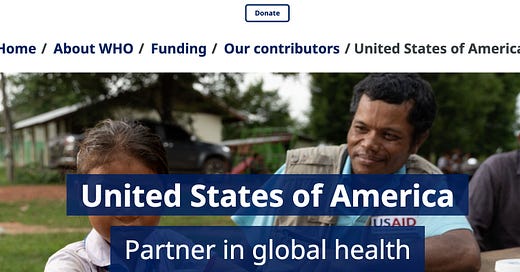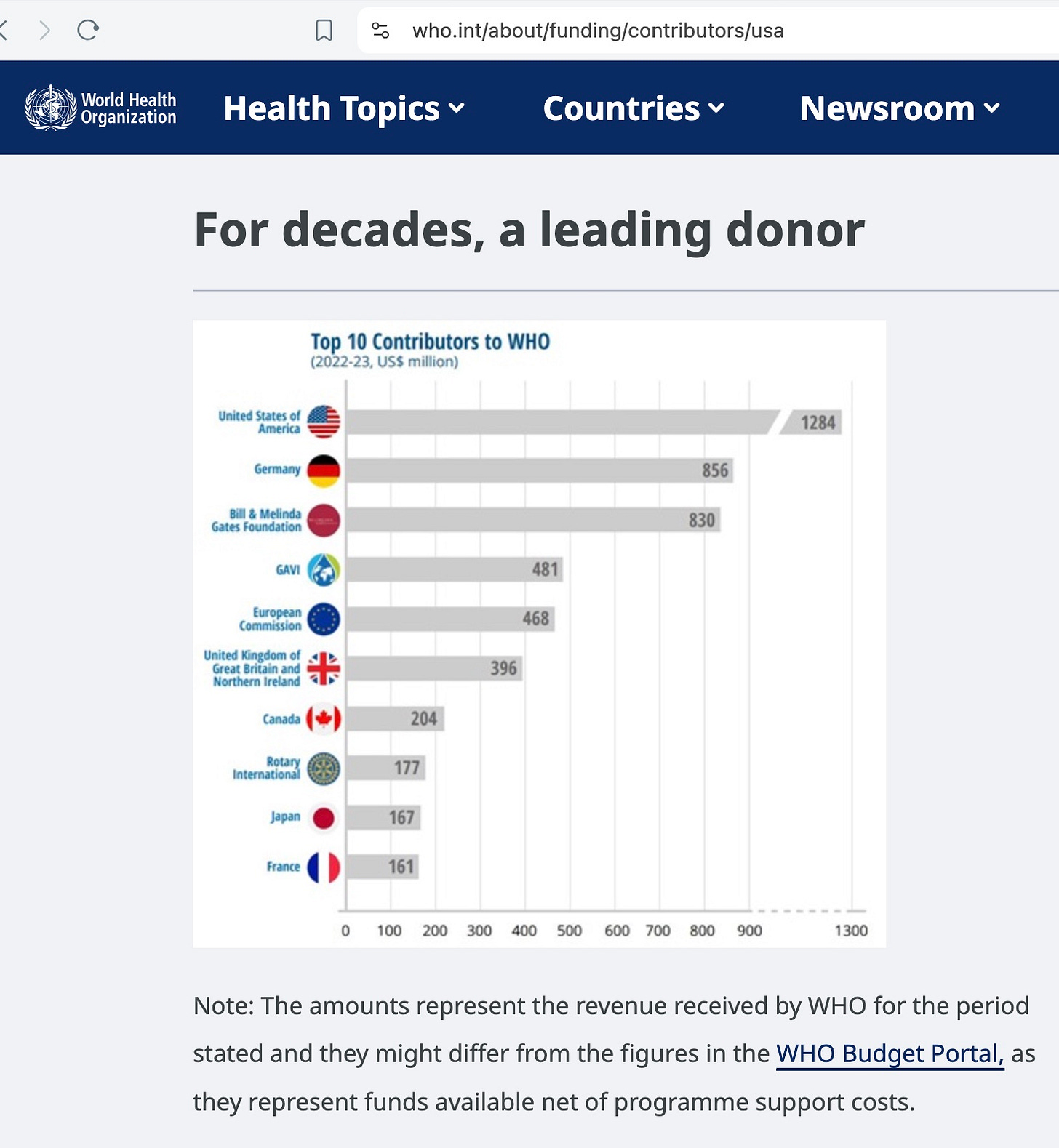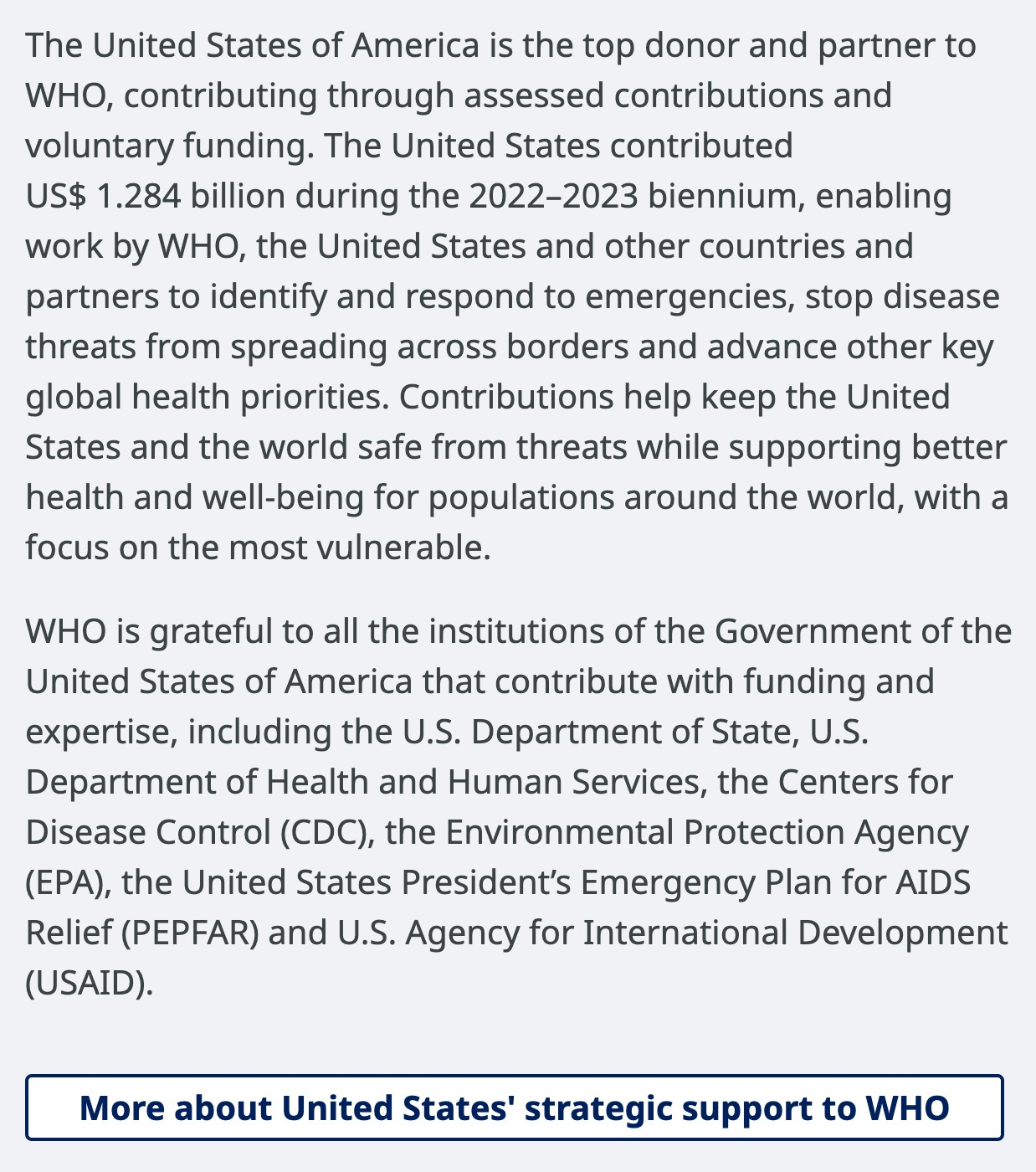WHO makes nice to US government in bid to avoid being cancelled by Trump
Article dated December 24, 2024. Provides many reasons to leave the WHO.
https://www.who.int/about/funding/contributors/usa
The United States of America and WHO are advancing global health security through their renewed five-year partnership, extending the Global Health Security Agenda (GHSA) to 2028, in support of accelerating implementation of the International Health Regulations (IHR). This initiative aims to help 100 countries achieve “Demonstrated Capacity” in key health security areas, with 58 Member States meeting this target by 2023. As of 2024, experts from the United States have supported nearly half of all WHO Joint External Evaluation (JEE) missions, reaffirming the country’s commitment to global preparedness.
[However, how high countries scored on the JEE test of outbreak preparedness was INVERSELY related to their early COVID mortality rates, indicating the JEE is a disaster, a joke—Nass]
In outbreak response, the Unites States has worked closely with WHO to stop emergencies such as the mpox outbreak in the Democratic Republic of Congo (DRC) and neighbouring countries. Since March 2024, the USA has contributed over US$ 22 million to mpox response efforts, supporting vaccine delivery and capacity building in six African countries. Support from the United States to WHO and Africa CDC for regulatory work towards delivery of vaccines has been critical to tackle the mpox outbreak.
Additionally, the United States partnered with Rwanda and WHO to address the Marburg virus disease (MVD) outbreak in 2024 through enhanced surveillance, contact tracing, and public health communication. These efforts reflect a strong dedication to tackling health crises collaboratively and effectively.
The United States and WHO share a long-standing partnership, delivering life-saving humanitarian assistance to communities devastated by conflict, natural disasters, and disease outbreaks. Leadership from the United States has been instrumental in protecting vulnerable populations—such as in Africa during the fight against deadly diseases like Ebola—and in ensuring health systems remain strong and responsive during crises. By supporting WHO’s emergency health efforts, the United States drives global health security, from preventing and preparing for future threats to delivering rapid response and recovery when it matters most.
___
Regulatory systems strengthening
The U.S. Department of Health and Human Services, through the FDA, supports the African Vaccine Regulatory Forum (AVAREF) to conduct clinical trials for vaccines and other medical products that are a public health priority for the continent, bolstering Africa’s capacity for vaccine and medical product regulation. This initiative ensures timely evaluation of vaccines during public health emergencies, such as the mpox outbreak.
[Africa can conduct its own jiggered vaccine trials, just like first world countries, and provide the human subjects that are desperately sought by pharmaceutical companies. Another advantage of conducting trials in Africa is that oversight by FDA/EMA/MHRA/TGA would be difficult to impossible to carry out, so they are easier to fudge. Pressing more subjects into pharma’s service was one of the goals of the Pandemic Treaty.—Nass]
Through collaboration with WHO’s regulatory strengthening program and the Global Benchmarking Tool, FDA assistance has helped multiple African countries enhance their regulatory systems, with six additional countries achieving Maturity Level 3 since 2022. The support from the United States towards these efforts are vital for advancing public health priorities across the continent and enhancing global health security.
WHO's work on regulatory systems strengthening
__________________
Digital health for stronger health data
The United States and WHO are partnering to strengthen digital health systems in low- and middle-income countries, enhancing equitable access to care. In Africa, integrating immunization data into DHIS2 platforms in 12 countries has enabled real-time health tracking, helping identify underserved populations and “zero-dose” children. GIS-based mapping through the WHO Geolocated Health Facilities Data initiative has further supported countries like Nigeria, Ethiopia, and Mozambique in addressing health disparities and improving interventions, also reaching thousands of unvaccinated children in Chad and Cameroon.
[This real-time tracking is prototyping systems that will be adopted in the US and elsewhere to be sure no one remains unvaccinated. It may also be a prototype for the sharing of medical records with the WHO, as described in Pandemic Treaty drafts—Nass]







They need to be abolished adding UN as well
The real crime is what has been done to Africa by the likes of Bill Gates and the U.S. Using those human beings as lab rats. I hope there is a special place in Hell for the ppl responsible for all the death and misery in that country.